XX七年级上册英语知识点:7-9单元
七上英语1至9单元2d的知识点
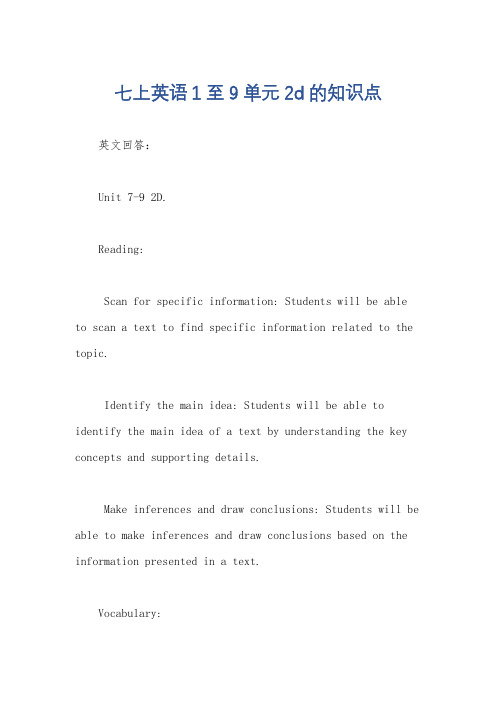
七上英语1至9单元2d的知识点英文回答:Unit 7-9 2D.Reading:Scan for specific information: Students will be able to scan a text to find specific information related to the topic.Identify the main idea: Students will be able to identify the main idea of a text by understanding the key concepts and supporting details.Make inferences and draw conclusions: Students will be able to make inferences and draw conclusions based on the information presented in a text.Vocabulary:New vocabulary: Students will learn new vocabulary related to the topics covered in Units 7-9, such as"climate change," "environment," and "technology."Academic vocabulary: Students will learn academic vocabulary that is essential for understanding complex texts, such as "analyze," "critique," and "synthesize."Grammar:Present perfect tense: Students will be able to usethe present perfect tense to talk about actions or events that started in the past and continue to the present.Past perfect tense: Students will be able to use the past perfect tense to talk about actions or events that happened before another past event.Modals: Students will be able to use modals (e.g., can, could, may, might, should) to express possibility, ability, permission, and advice.Writing:Descriptive writing: Students will be able to write descriptive paragraphs that use vivid language and sensory details to create a clear picture for the reader.Expository writing: Students will be able to write expository essays that develop a clear and well-organized argument or explanation.Narrative writing: Students will be able to write narratives that tell a story or describe an event.Speaking:Oral presentations: Students will be able to deliver oral presentations that are clear, concise, and engaging.Class discussions: Students will be able toparticipate in class discussions by sharing their ideas and responding to the ideas of others.Group projects: Students will be able to work in groups to complete projects that require collaboration and communication.Culture:Cultural awareness: Students will be exposed to different cultures and perspectives through the texts, videos, and activities in Units 7-9.Cultural understanding: Students will be able to demonstrate their understanding of different cultures and how they shape our world.中文回答:7-9单元2d知识点。
人教版七年级上册英语Unit9知识点梳理及语法讲义(教师版)
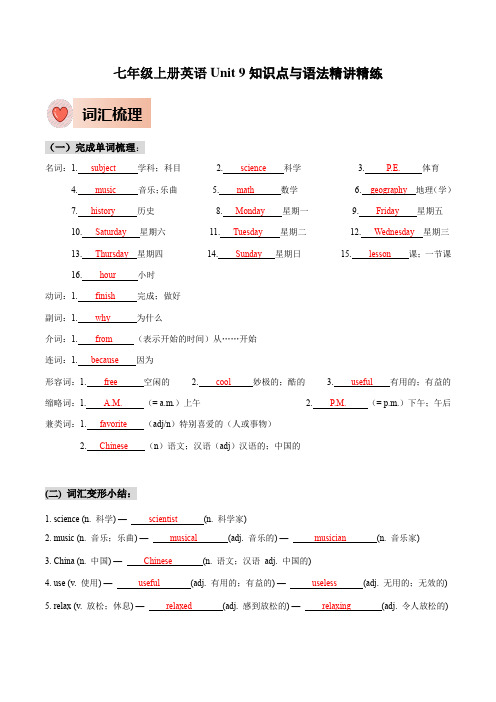
七年级上册英语Unit 9知识点与语法精讲精练词汇梳理(一)完成单词梳理:名词:1. subject学科;科目 2. science 科学 3. P.E. 体育4. music 音乐;乐曲5. math 数学6. geography 地理(学)7. history 历史8. Monday 星期一9. Friday 星期五10. Saturday 星期六11. Tuesday 星期二12. Wednesday 星期三13. Thursday 星期四14. Sunday 星期日15. lesson 课;一节课16. hour 小时动词:1. finish 完成;做好副词:1. why 为什么介词:1. from (表示开始的时间)从……开始连词:1. because 因为形容词:1. free 空闲的 2. cool 妙极的;酷的 3. useful 有用的;有益的缩略词:1. A.M. (= a.m.)上午 2. P.M. (= p.m.)下午;午后兼类词:1. favorite (adj/n)特别喜爱的(人或事物)2. Chinese (n)语文;汉语(adj)汉语的;中国的(二) 词汇变形小结:1. science (n. 科学) — scientist (n. 科学家)2. music (n. 音乐;乐曲) — musical (adj. 音乐的) — musician (n. 音乐家)3. China (n. 中国) — Chinese (n. 语文;汉语adj. 中国的)4. use (v. 使用) — useful (adj. 有用的;有益的) — useless (adj. 无用的;无效的)5. relax (v. 放松;休息) — relaxed (adj. 感到放松的) — relaxing (adj. 令人放松的)【练一练】用所给词的适当形式填空1.We have nine ___subjects___(subject) at school.2.Do you think P.E. is __relaxing____ (relax)?3.He always ___plays_____ (play) games with us.4.Mr. Lee is our __Chinese ___ (China) teacher.5.I want to meet (meet) you in the park this afternoon.6.I think playing volleyball is very relaxing (relax). I love it.7.Are puter games very ___useful_____ (use) for you?8.Miss Wang’s classes (class) are interesting.9.What’s her (she) favorite food?10.We have four lessons (lesson) this morning.(三) 短语攻关:for sure 无疑;肯定from...to... 从……到……favorite subject 最喜欢的学科play games with sb 和某人玩游戏the next day 第二天Chinese class 语文课after that 在那之后have an art lesson 上一节美术课for two hours 两小时on Friday afternoon 在星期五下午知识点梳理1. What’s your favorite subject? 你最喜欢的学科是什么?【用法详解】知识点1:(1)favorite作形容词,意为“特别喜爱的”,通常用于名词前作定语,其前常与形容词性物主代词或名词所有格搭配使用。
七年级英语上册第九单元的必背知识点

七年级英语上册第九单元的必背知识点一、词汇学科相关:subject, science, math, English, Chinese, history, geography, biology, music, art, physics, chemistry, politics等。
日常活动:play games, have math, have an art lesson, for two hours, on Monday, the next day等。
其他词汇:favorite, comfortable, seat, screen, close, service, quality, theater, cinema, clothing, jeans, trendy, teenager, easy, FM, AM, jazz, worse, worst, bargain, delight, meal, positive, negative, dull, loud, talent, performer, success, act, without, together, musical, distance, near, farthest, province, southern, northern, lovely, snow, enough等。
二、短语最喜欢的学科:favorite subject体育老师:P.E. teacher玩游戏:play games第二天:the next day在星期一:on Monday上数学课:have math上美术课:have an art lesson两小时:for two hours无疑,肯定:for sure足球比赛:soccer game从……到……:from...to...和某人玩游戏:play games with sb.完成做某事:finish doing sth.在星期几:on+星期几感谢你……:Thank you for...想要做某事:want to do sth.三、句型询问最喜欢的学科:What's your favorite subject?回答最喜欢的学科:My favorite subject is science.询问原因:Why do you like...?(如Why do you like music?)回答原因:Because it is fun./Because...(如Because it is interesting.)询问课程时间:When is your math class?回答课程时间:At 8:00 I have math.感谢邮件:Thank you for your e-mail.四、语法规则形容词最高级:如worst, farthest等,用于三者或三者以上的比较。
人教版七年级英语上册7—9单元复习课件(共20张PPT)
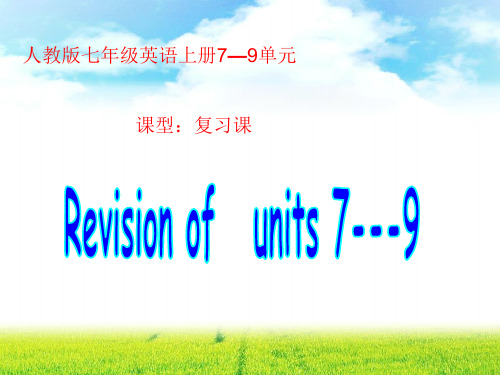
❖
11、人总是珍惜为得到。2021/6/252021/6/252021/6/25Jun-2125-Jun-21
❖
12、人乱于心,不宽余请。2021/6/252021/6/252021/6/25Fri day, June 25, 2021
❖
13、生气是拿别人做错的事来惩罚自 己。2021/6/252021/6/252021/6/252021/6/256/25/2021
Made the first record(制作唱片
): 2008.10.16
………………..
Deng Ziqi is a……..singer . …….
2021/6/20
18
Homework
1.Review units10---12 2.Write a composition about Deng Ziqi
Mrs. Li: Good idea.
Clerk: What color do you want?
Mrs. Li: My son likes red, do you have red T-shirts?
Clerk: Sorry, we don't have red ones. What about the blue one?
13
三。单项选择
1. I was born ____A____ 1996 .9.2
A. on B. in C. to D. with
2. -- Does he often __B_ her homework in the evening?
No,He often __it after school.
人教版七年级英语上册7—9单元 课型:复习课
Brainstorm(头脑风暴) Spell the word one by one(依次快速拼读单词,一个单词一分)
人教版英语七年级上册重点总结(7-9单元)
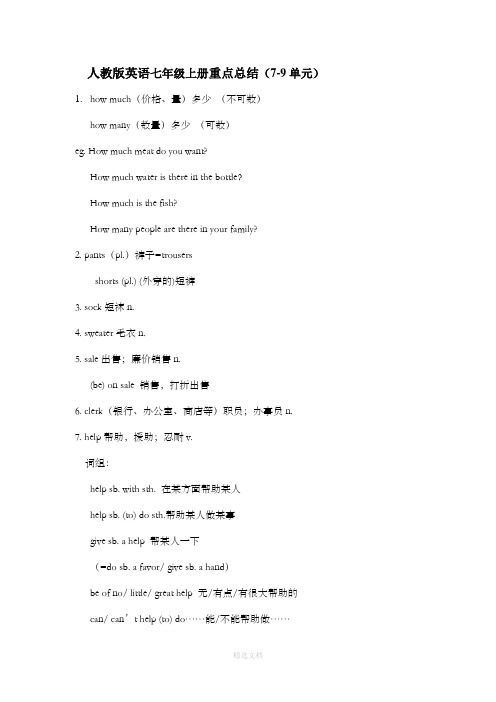
人教版英语七年级上册重点总结(7-9单元)1.how much(价格、量)多少(不可数)how many(数量)多少(可数)eg. How much meat do you want?How much water is there in the bottle?How much is the fish?How many people are there in your family?2. pants(pl.)裤子=trousersshorts (pl.) (外穿的)短裤3. sock短袜n.4. sweater毛衣n.5. sale出售;廉价销售n.(be) on sale 销售,打折出售6. clerk(银行、办公室、商店等)职员;办事员n.7. help帮助,援助;忍耐v.词组:help sb. with sth. 在某方面帮助某人help sb. (to) do sth.帮助某人做某事give sb. a help 帮某人一下(=do sb. a favor/ give sb. a hand)be of no/ little/ great help 无/有点/有很大帮助的can/ can’t help (to) do……能/不能帮助做……can/can’t help doing…….忍得住/忍不住,禁不住……8. want需要;想要v. + sb.(to do)/sth./ to do词组:want to do sth.want sb. (not) to do sth.9. Here you are. 给你10. example例子;实例n.词组:for example例如set a good/ bad example for sb. 为某人树立好/坏的榜样11. store商店n. 储存vt.12. buy购买;买v.词组:buy sb. sth. = buy sth. for sb.13. price价格n.词组:at a low/ high price 以低/高的价格What’s the price of ……?14. afford负担得起;买得起v.词组:can/ can’t afford (to do) sth.支付得起(做)某事/物的费用15. see看见v.词组:see sb./ sth. do sth. (有意识地)观看/ 看某人/物做某事see sb./ sth. doing sth.(无意地)看到……16. yourself你自己(反身代词)pron.17. sell销售;卖v.词组:sell sth. (to sb.)18. from从;从……起prep.19. have/ take a look (at)看一看;看一眼20. sorry抱歉的;遗憾的;难过的adj.feel sorry for sb. 替某人感到惋惜/难过feel sorry about (doing) sth. 因做某事而感到歉疚say sorry to sb.对某人表示歉意be sorry to do sth. 对做某事而感到遗憾/难过/歉疚be sorry + that从句:抱歉……Unit 81. when(疑问副词)什么时候;何时adv.2. January一月;正月n.3. February 二月n.4. March三月n.5. April四月n.6. August八月n.7. September九月n.8. October 十月n.9. November 十一月n.10. December 十二月n.11. second 第二num.12. third 第三num.13. fifth 第五num.14. ninth num.第九15. twelfth num.第十二16. twentieth num.第二十17. thirtieth num.第三十18. date n.日期What’s the date today? 今天几号?date back to… 追溯到……These old building dates back to Qin dynasty.这座古建筑可以追溯到秦朝。
课堂笔记(人教版英语七年级上)Unit7-Unit9
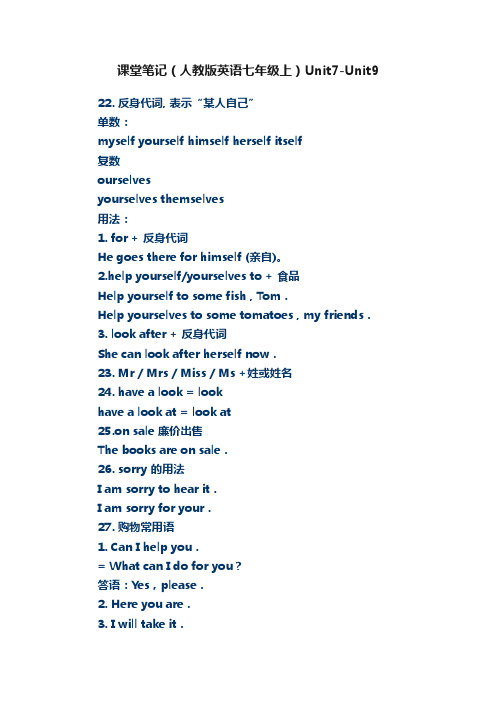
课堂笔记(人教版英语七年级上)Unit7-Unit922. 反身代词, 表示“某人自己”单数:myself yourself himself herself itself复数ourselvesyourselves themselves用法:1. for + 反身代词He goes there for himself (亲自)。
2.help yourself/yourselves to + 食品Help yourself to some fish , Tom .Help yourselves to some tomatoes , my friends .3. look after + 反身代词She can look after herself now .23. Mr / Mrs / Miss / Ms +姓或姓名24. have a look = lookhave a look at = look at25.on sale 廉价出售The books are on sale .26. sorry 的用法I am sorry to hear it .I am sorry for your .27. 购物常用语1. Can I help you .= What can I do for you ?答语:Yes,please .2. Here you are .3. I will take it .= I will have it .= I will buy it .28 . 一般将来时态:表示将来的动作或状态。
构成:助动词will+动词原形。
时间状语:将来时间next week / month / year , tomorrow 等。
句型变化:将来型He will study English .否定He won’t study English .一般疑问句 Will he study English ?回答: Yes,he will ;No, he won’t .特殊疑问句What will he study ?29. 几个重要介词1. atHe buys a T-shirt at Huaxing’s great sale. They have pants at a very good price .2. forA . 表示“交换的价格”He has pants for only ¥50 .B. 表示“对某人来讲”For me , I will study hard .C . for + 反身代词We will go there for ourselves next week .3. inA.在---内部My pen is in the desk .B . in +颜色I have bags in red .= I have red bags . She is in red .=She wears red clothes . Unit8单词1. 一年12月份JanuaryFebruaryMarchAprilMayJuneJulyAugustSeptemberOctoberNovember December2. 一周的七天SundayMondayTuesdayWednesday ThursdayFridaySaturday3. 一年四季springsummerautumn / fallwinter语法A.数词的分类基数词:表示数量序数词:表示顺序A . 1 one first2 two second3 three third4 four fourth5 five fifth6 six sixth7 seven seventh8 eight eighth9 nine ninth10 ten tenthB . 11 eleven eleventh12 twelve twelfth13 thirteen thirteenth14 fourteen fourteenth15 fifteen fifteenth16 sixteen sixteenth17 seventeen seventeenth18 eighteen eighteenth19 nineteen nineteenthC. 20 twenty twentieth30 thirty thirtieth40 forty fortieth50 fifty fiftieth60 sixty sixtieth70 seventy seventieth80 eighty eightieth90 ninety ninetieth100 hundred hundredthD . 几十几23 twenty-threetwenty-thirdB.when 引起的特殊疑问句1. His birthday is on Jan.2nd .When is his birthday ?2.Their parties is on Sunday .When are their parties ?3.The students go to school on Monday . When do the students go to school ?4.She can go home in the afternoon.When can she go home ?5.Mary does her homework in the evening . When does Mary do her homework ?6.They will have a parents’ meeting this Friday. When will they have a parents’ meeting ?when 与 what time 的区别:when 笼统时间what time 具体时刻1.He watches TV in the evening .When does he watch TV ?2. They watch the game at 8 o’clock .What time do they watch the game ?C. 提问“星期”和“日期”1. It’s Monday today .What day is it today ?2. It’s Feb.3rd today . What’s the date today ?词汇知识1.birthday(复) birthdays2. monthmouthmouse3.happy (同义) glad , pleased (反义) unhappy sad4.Happy birthday to you ! (答语) Thanks 或 Thank you .5.old (反义) new , young6.speech (复数) speeches7.party (复数) parties8.演讲比赛speech contest9.一件艺术品an art10.一堂美术课an art lesson / class11.Chinese:汉语;中国人用汉语 in Chinese中国 China三个中国人three Chinese一位汉语老师/课a Chinese teacher/ lesson / class Chinese(复数) Chinese Japanese(复数) Japanese12.听音乐listen to music13.她13岁了。
七年级上册Unit7-9知识点
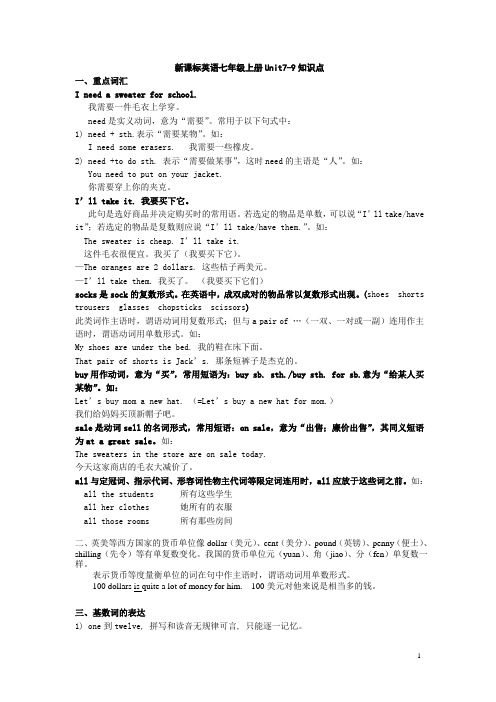
新课标英语七年级上册Unit7-9知识点一、重点词汇I need a sweater for school.我需要一件毛衣上学穿。
need是实义动词,意为“需要”。
常用于以下句式中:1) need + sth.表示“需要某物”。
如:I need some erasers. 我需要一些橡皮。
2) need +to do sth. 表示“需要做某事”,这时need的主语是“人”。
如:You need to put on your jacket.你需要穿上你的夹克。
I’ll take it. 我要买下它。
此句是选好商品并决定购买时的常用语。
若选定的物品是单数,可以说“I’ll take/have it”;若选定的物品是复数则应说“I’ll take/have them.”。
如:The sweater is cheap. I’ll take it.这件毛衣很便宜。
我买了(我要买下它)。
—The oranges are 2 dollars. 这些桔子两美元。
—I’ll take them. 我买了。
(我要买下它们)socks是sock的复数形式。
在英语中,成双成对的物品常以复数形式出现。
(shoes shorts trousers glasses chopsticks scissors)此类词作主语时,谓语动词用复数形式;但与a pair of …(一双、一对或一副)连用作主语时,谓语动词用单数形式。
如:My shoes are under the bed. 我的鞋在床下面。
That pair of shorts is Jack’s. 那条短裤子是杰克的。
buy用作动词,意为“买”,常用短语为:buy sb. sth./buy sth. for sb.意为“给某人买某物”。
如:Let’s buy mom a new hat. (=Let’s buy a new hat for mom.)我们给妈妈买顶新帽子吧。
2017七年级上册英语知识点:7-9单元
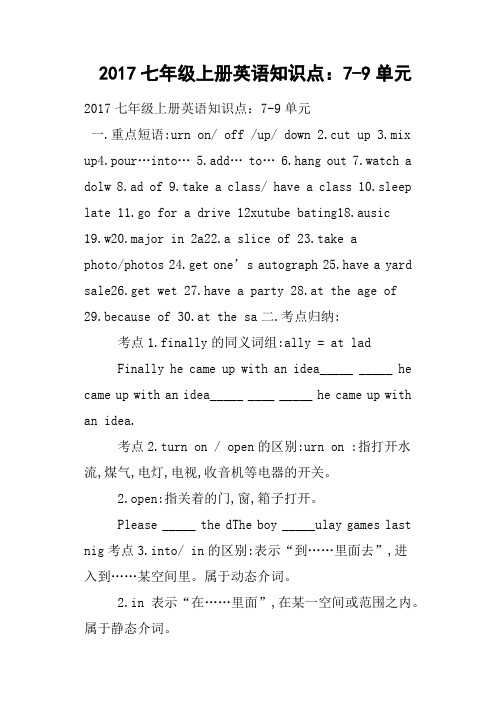
2017七年级上册英语知识点:7-9单元2017七年级上册英语知识点:7-9单元一.重点短语:urn on/ off /up/ down 2.cut up 3.mix up4.pour…into… 5.add… to… 6.hang out 7.watch a dolw 8.ad of 9.take a class/ have a class 10.sleep late 11.go for a drive 12xutube bating18.ausic 19.w20.major in 2a22.a slice of 23.take aphoto/photos 24.get one’s autograph 25.have a yard sale26.get wet 27.have a party 28.at the age of 29.because of 30.at the sa二.考点归纳:考点1.finally的同义词组:ally = at ladFinally he came up with an idea_____ _____ he came up with an idea_____ ____ _____ he came up with an idea.考点2.turn on / open的区别:urn on :指打开水流,煤气,电灯,电视,收音机等电器的开关。
2.open:指关着的门,窗,箱子打开。
Please _____ the dThe boy _____ulay games last nig考点3.into/ in的区别:表示“到……里面去”,进入到……某空间里。
属于动态介词。
2.in表示“在……里面”,在某一空间或范围之内。
属于静态介词。
Tg _____ the blendHe put his books ______his backpack and l考点4.too…to…的同义句:…to…= not…enough to … = so…that…Hung that he can’t glHe isn’t _____ ____ to go schoolHe is _____ young _____ glThe boxavy for us to caThe box isn’t _____ _____ to caThe box is ____ heavy ____ we ____ ca考点5.called的同义句:called = named = wame (of)Do you know the girl called Kate ?=Do you know the girl ______Kate ?=Do you know the girl _____ _____ _____ (of)Kate ?考点6.see sb do sth、see sb doing sth的区别b do sth :看见某人做了某事2.see sb doing sth .看见某人正在做某事The teacher saw the students _______(read) English waLook!Can yougirl _____(dance) und?注:类似的动词有:hear ,wa等。
七上英语九单元知识点

七上英语九单元知识点
答:七上英语九单元的知识点主要包括以下几个方面:
1. 重点词汇:掌握并能够正确运用本单元的关键词汇,如“购物”、“商店”、“价格”、“物品”等。
2. 重点句型:能够熟练运用本单元的句型进行简单的购物对话,如“How much does it cost?”、“I will take it.”等。
3. 语法知识:掌握并能够运用基本的购物用语和表达方式,如“Can I help you?”、“I want to buy a T-shirt.”等。
4. 语音知识:能够正确发音本单元的单词和句型,如“How much”、“How many”、“What color”等。
5. 文化知识:了解不同国家的购物习惯和礼仪,尊重不同文化背景下的消费习惯。
总之,七上英语九单元的知识点需要学生掌握购物的基本用语、表达方式和文化背景,提高学生的口语交际能力。
同时,学生还需要注意单词的拼写和发音,以及语法结构的正确运用。
七年级上册unit7~9重点

七年级上册unit 7~9重点一、单词sock袜子T-shirt T恤衫shorts短裤sweater毛衣trousers裤子shoe鞋子skirt裙子clothes衣服big大的small小的short短的;矮的long长的dollar美元store商店buy买sell卖sale特价销售price价格pair一双;一对very非常;很man男子(men) woman女子(women)need需要look看take买下;拿;取all所有的;全部的month月January一月February二月March三月April四月May五月June六月July七月August八月September九月October十月November十一月December十二月happy愉快的;高兴的old年老的;旧的party晚会test测验;检查trip旅行festival节日dear亲爱的thing东西favorite特别喜爱的term学期busy忙碌的time时间subject学科science科学P.E.体育music音乐history历史history历史math数学Chinese语文art艺术;美术geography地理Monday星期一Tuesday星期二Wednesday星期三Thursday星期四Friday星期五Saturday星期六Sunday星期天why为什么because因为free空闲的cool酷的useful有用的finish完成(doing sth.)lesson课hour小时(an hour)二、短语a pair of一双for sure无疑;肯定from...to... 从......到.......two pair s of shoes两双鞋at good price以...价格卖on sale促销;大减价basketball game篮球比赛English test英语测验art festival艺术节play games with sb和....玩游戏be busy忙碌on Sunday 在星期天in the moring三、句子1.Can I help you? 我能帮你吗?Yes, please. / No, thank you.2.Here you are.给你。
新目标七上英语unit7-9(知识点总结和语言点讲解
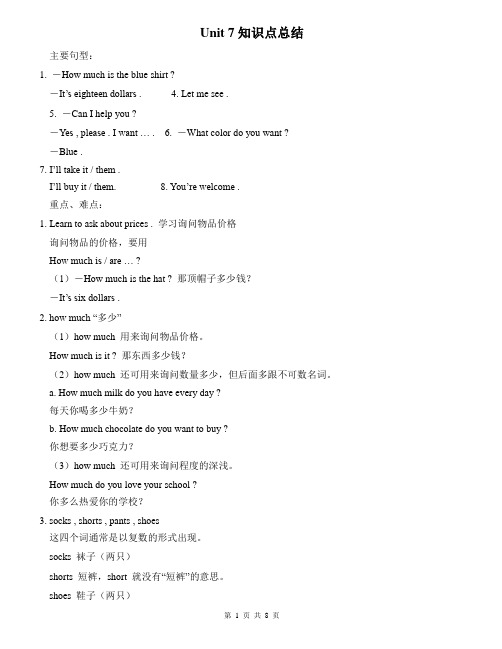
Unit 7知识点总结主要句型:1. -How much is the blue shirt ?-It’s eighteen dollars . 4. Let me see .5. -Can I help you ?-Yes , please . I want … . 6. -What color do you want ?-Blue .7. I’ll take it / them .I’ll buy it / them. 8. You’re welcome .重点、难点:1. Learn to ask about prices . 学习询问物品价格询问物品的价格,要用How much is / are … ?(1)-How much is the hat ? 那顶帽子多少钱?-It’s six dollars .2. how much “多少”(1)how much 用来询问物品价格。
How much is it ? 那东西多少钱?(2)how much 还可用来询问数量多少,但后面多跟不可数名词。
a. How much milk do you have every day ?每天你喝多少牛奶?b. How much chocolate do you want to buy ?你想要多少巧克力?(3)how much 还可用来询问程度的深浅。
How much do you love your school ?你多么热爱你的学校?3. socks , shorts , pants , shoes这四个词通常是以复数的形式出现。
socks 袜子(两只)shorts 短裤,short 就没有“短裤”的意思。
shoes 鞋子(两只)pants 裤子pant就没有“裤子”的意思。
因此在询问价格时,我们说*另外,当我要表达一双袜子,一条裤子等时,We saya pair of socksa pair of shortsa pair of shoesa pair of pants注意:当提问a pair of socks / shorts / …多少钱时,我们说-How much is a pair of socks ?-It’s ….4. colors 颜色black , white , blue , brown (棕色的), green , pink (粉红), purple (紫色), yellow , grey (灰色)。
七年级英语unit7---9知识归纳

Unit7----9知识归纳Ⅰ.重点单词及短语衣服____短袜____T恤衫____短裤____毛衣__裤子____鞋____裙子____多少钱____价格___美元____商店____十一____十二____十三___十五____十八____二十____三十__大号的____小号的____长的____短的__买____卖____月份____一月____二月____九月____十月_十一月____十二月____第一____第二____第三____第五____第八____第九____第十二__第二十____第三十____旅行____节日____事情____学期____实间____忙碌的____科目____科学____数学____地理____历史____星期二___星期四____星期三____星期六____最喜欢的____无聊的____空闲的____有用的____妙极的____完成____1.need…for…需要……做……2.sounds good 听起来不错3. a pair of……一双4.two pairs of……两双5.at very good…prices以非常合理的价格6. come to ……来……7.buy sth. for sb. 给某人买某物8.on sale 打折9. for sale待售 a big red hat____ 10.look nice __11.birthday party ____12.want to do sth____.13.school trip____14.English test____15.have an art festival____ 16.book sale____ 17.have a good time ____18.like to do sth. ___19.like doing sth. ____20.Children’Day____21.play with sb.___22.How’s your day? ____ 23.the next day____ 24.for sure____ 25.have math____ 26.from … to…____ 27.finish doing sth. ____ 28.a useful book ____29.have an art lesson for two hours ____30.Is that OK with you? ____31.School Day____32. have a look at ____Ⅱ.句型1.询问价格:How much is +单数商品?How much are + 复数商品?It’s + 钱They’re + 钱What’s the price of + 商品?It’s + 钱2. 询问数量how many + 可数名词,how much + 不可数名词3. socks, shoes, pants,trousers等都是成双成对的物品,一般以复数形式出现,作主语时谓语动词用复数形式。
七年级英语知识点7一9课
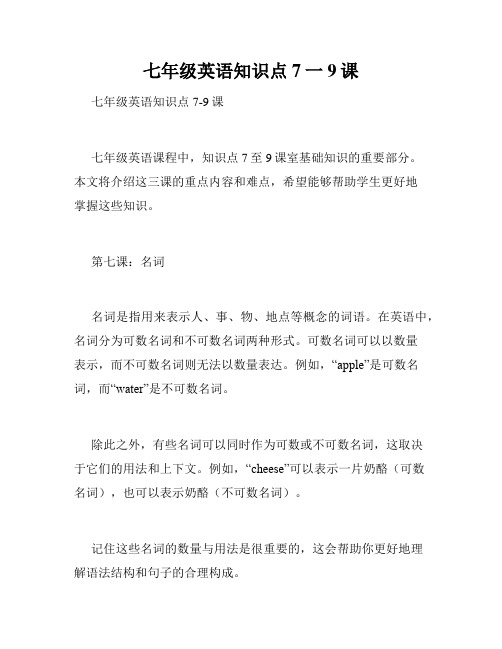
七年级英语知识点7一9课七年级英语知识点7-9课七年级英语课程中,知识点7至9课室基础知识的重要部分。
本文将介绍这三课的重点内容和难点,希望能够帮助学生更好地掌握这些知识。
第七课:名词名词是指用来表示人、事、物、地点等概念的词语。
在英语中,名词分为可数名词和不可数名词两种形式。
可数名词可以以数量表示,而不可数名词则无法以数量表达。
例如,“apple”是可数名词,而“water”是不可数名词。
除此之外,有些名词可以同时作为可数或不可数名词,这取决于它们的用法和上下文。
例如,“cheese”可以表示一片奶酪(可数名词),也可以表示奶酪(不可数名词)。
记住这些名词的数量与用法是很重要的,这会帮助你更好地理解语法结构和句子的合理构成。
第八课:介词介词是一个表示方位、时间或关系的词语。
它们通常放在名词或代词之前,并与其相连形成短语。
例如,“at”、“in”、“on”、“to”和“with”都是常见的介词。
介词很容易被忽略,因为它们的意义通常相对来说比较抽象。
因此,学习者必须要理解他们的含义和常见用法。
第九课:动词的时态动词时态可以表示动作或状态所发生的时间。
在英语中,常见的时态有:现在时、过去时和将来时。
每种时态可以帮助我们更好地理解句子的意思和时间。
现在时态表示目前正在发生的动作或状态。
例如:“I am studying English.”(我正在学习英语)过去时态表示事件或状态在过去发生或存在。
例如:“I studied English last year.”(我去年学习了英语)将来时态表示将要发生的动作或状态。
例如:“I will study English to morrow.”(明天我将会学习英语)掌握时态转换的规则可以帮助学生更好地理解英语的语法和句子结构。
总结以上是知识点7至9课程的主要内容。
虽然这只是每一课的简要介绍,但是理解这些基础知识对于学习英语来说是至关重要的。
在掌握了这些基础知识的基础上,我们才能够更好地理解复杂的语法、文本和课程内容。
七年级上册英语知识点 (全册)

七年级上册英语知识点 (全册)1. 单元一:Hello, my name is.a. 重点词汇:- Hello: 问候语- Good morning: 早上好- Good afternoon: 下午好- Good evening: 晚上好- My name is: 我的名字是- How are you?: 你好吗?- I'm fine, thank you. And you?: 我很好,谢谢。
你呢?- Goodbye: 再见b. 重点句型:- Introducing yourself: 介绍自己- Hello, my name is [name]. I'm from [country/city].- Asking for introduction: 询问对方介绍- Nice to meet you. Can you introduce yourself?2. 单元二:What's your name?a. 重点词汇:- What's your name?: 你的名字是什么?- My name is: 我的名字是- How old are you?: 你多大了?- I'm 12 years old: 我12岁- Where are you from?: 你来自哪里?- I'm from China: 我来自中国b. 重点句型:- Asking someone's name and age: 询问某人的名字和年龄- What's your name? My name is [name]. How old are you? I'm [age] years old.- Introducing your friends: 介绍你的朋友- This is my friend [name]. She/He is [age] years old.3. 单元三:Hello, how are you?a. 重点词汇:- Hello: 问候语- How are you?: 你好吗?- I'm fine, thank you. And you?: 我很好,谢谢。
七年级上册英9单元知识点

七年级上册英9单元知识点
英语9是七年级英语学习中的一个重要单元,它主要包含了英
语的基本知识点。
在本文中,我们将会了解到英语9单元的主要
内容和重点知识点。
1.基本语法
英语9单元的第一个重点就是基本语法。
这包括了动词的时态、被动语态和情态动词等基础知识。
在学习这个单元时,需要掌握
动词的不同时态和其使用场合;被动语态的构成和用法;以及情
态动词的相关用法和特点。
2.名词和代词
第二个重点是名词和代词。
在这个单元中,我们需要学习名词
的种类和用法,例如单数和复数形式、可数和不可数名词等;同时,我们还需要了解代词的使用方法以及其与名词的关系。
3.形容词和副词
英语9单元的第三个重点是形容词和副词。
这部分知识点主要包括了形容词和副词的基本形式和比较级、最高级的构成方式以及相关用法等内容。
4.介词和连词
介词和连词是英语9单元的第四个重点。
学习这部分知识点需要了解介词的构成方式和使用场合;以及连词的种类和用法,如并列连词、从属连词等。
5.冠词和数词
最后一个重点是冠词和数词。
在这部分知识点中,我们需要了解冠词的种类和使用方法,如定冠词和不定冠词;以及数词的形式和不同用法,如基数词和序数词等。
以上就是英语9单元的主要知识点。
在学习这些知识点时,我们需要将其联系起来,注重语法和语言表达的实际运用。
只有掌握了这些基础知识点,才能更好地进行英语学习和交流。
2024英语七年级上册笔记
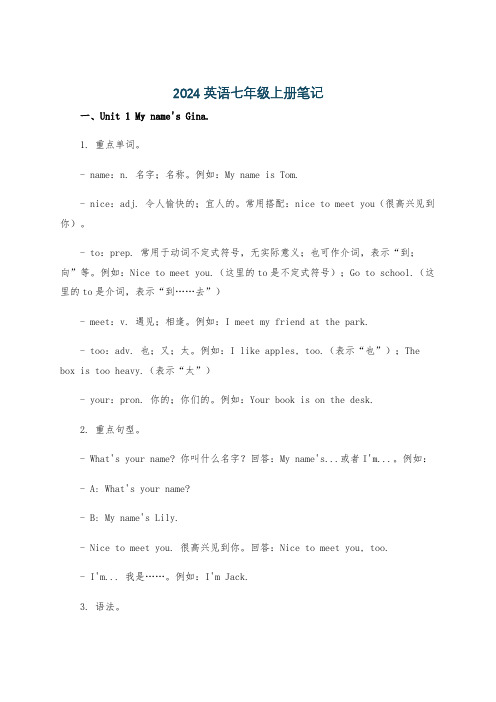
2024英语七年级上册笔记一、Unit 1 My name's Gina.1. 重点单词。
- name:n. 名字;名称。
例如:My name is Tom.- nice:adj. 令人愉快的;宜人的。
常用搭配:nice to meet you(很高兴见到你)。
- to:prep. 常用于动词不定式符号,无实际意义;也可作介词,表示“到;向”等。
例如:Nice to meet you.(这里的to是不定式符号);Go to school.(这里的to是介词,表示“到……去”)- meet:v. 遇见;相逢。
例如:I meet my friend at the park.- too:adv. 也;又;太。
例如:I like apples, too.(表示“也”);The box is too heavy.(表示“太”)- your:pron. 你的;你们的。
例如:Your book is on the desk.2. 重点句型。
- What's your name? 你叫什么名字?回答:My name's...或者I'm...。
例如:- A: What's your name?- B: My name's Lily.- Nice to meet you. 很高兴见到你。
回答:Nice to meet you, too.- I'm... 我是……。
例如:I'm Jack.3. 语法。
- 形容词性物主代词:your(你的;你们的)。
形容词性物主代词后面要接名词。
例如:your pen(你的钢笔)。
二、Unit 2 This is my sister.1. 重点单词。
- sister:n. 姐;妹。
例如:My sister is a student.- brother:n. 兄;弟。
例如:His brother likes playing football.- parent:n. 父(母)亲。
七年级上册英语7到9单元知识点

七年级上册英语7到9单元知识点第一部分:Unit 71. 本单元主要学习的内容是关于时间的表达,包括现在进行时和一般现在时。
学生需要掌握时间状语的运用以及动词的变化规则。
2. 现在进行时的构成是主语+am/is/are+动词-ing形式。
例如:I am reading a book. She is watching TV. They are playing football.3. 一般现在时的构成是主语+动词原形+其他。
时间状语通常包括every day, always, often, sometimes等。
例如:I play basketball every day. She often visits her grandparents.第二部分:Unit 81. 本单元主要学习的内容是关于描述人物和个性特点,学生需要掌握形容词的用法和比较级的构成。
2. 形容词的构成有规则比较级和不规则比较级两种形式。
规则比较级的构成是在词尾加-er, 不规则比较级的变化需要记忆。
例如:tall—taller, good—better, bad—worse.3. 形容词的比较级有两种用法,一种是用来比较两者之间的差异,另一种是用来表示同一事物在不同时间或环境中的差异。
第三部分:Unit 91. 本单元主要学习的内容是关于健康和元音字母的拼读。
学生需要掌握一些关于饮食、锻炼和健康习惯的词汇和表达方式。
2. 元音字母包括a, e, i, o, u, 学生需要掌握这些元音字母在单词中的发音规律和常见的拼读规则。
例如:bat, net, pin, hot, nut.3. 学生需要通过学习本单元的内容,培养自己的健康意识,学会关注自己的饮食习惯和生活方式,从而能够拥有一个健康的生活方式。
通过学习以上三个单元的知识点,学生不仅可以掌握英语语法和词汇,还能够培养自己的健康意识和描述他人的能力。
这些知识点对于学生的全面发展都具有重要的意义。
七年级上册英语第九单元知识点
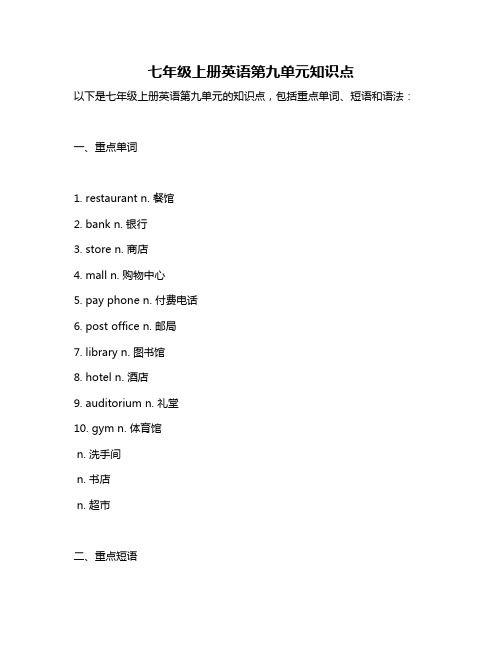
七年级上册英语第九单元知识点以下是七年级上册英语第九单元的知识点,包括重点单词、短语和语法:一、重点单词1. restaurant n. 餐馆2. bank n. 银行3. store n. 商店4. mall n. 购物中心5. pay phone n. 付费电话6. post office n. 邮局7. library n. 图书馆8. hotel n. 酒店9. auditorium n. 礼堂10. gym n. 体育馆n. 洗手间n. 书店n. 超市二、重点短语1. next to 紧邻2. between … and … 在……和……之间3. in front of 在……前面4. behind … 在……后面5. turn left/right 向左/右转6. on the left/right 在左/右边7. across from … 在……对面8. in the community center 在社区中心9. in the auditorium 在礼堂里10. in the gym 在体育馆里11. in the library 在图书馆里12. in the hotel 在酒店里13. on the phone 通过电话交谈14. pay for 为……付款15. have to 不得不;必须16. the way to … 去……的路;往……的路17. take a walk 散步18. play sports 做运动;进行体育运动;做体育运动;参加体育运动;做运动活动。
19、take a look at=look at看一看;瞧;编辑;查找;细看;看待;细瞧;检查。
20、have a good day过得开心。
21、at the end of在…结束的时候。
22、turn right=turn into拐入;驶进。
23、the next stop下一站。
24、spend…on…在某事上花费。
七年级上Unit7---9单元重点词组

Unit SevenHow much are these socks ?一、重点词、词语及句子1.look; watch; read与see的区别:look意为“看”,因想看而投注目光,不管结果如何,强调动作,后接宾语时与介词at连用。
watch意为“看”,指特别留意,注视;看电视及比赛。
see意为“看见;看到”,强调看的结果,无进行时态。
Read意思为“看”专指看书、报纸。
eg: Please look at the book. 请看书。
I watch TV every day. 我每天看电视。
I read the books every day. 我每天看书。
I often see him listen to the radio. 我经常看见他听收音机。
2.also与too的区别两词均有“也”之意,also用于句中,比较正式;too用在句末,且于前句用逗号隔开,常用于口语。
eg: He also plays basketball. 他也打篮球。
She is a teacher, too. 她也是一位教师。
3 )take 和bring的区别:这两个词的意思是“拿;取;带”,“take”表示把某物或某人从说话处“带到”或“拿到”别处去,常与介词“to”连用,有明显的方向性;“bring”指从另一处把某物或某人“带到”或“拿到”说话处。
eg: Please take your bag to your seat. 请把你的书包拿回你的座位。
Please bring your book here tomorrow. 请明天把你的书带到这。
4) Can I help you? 要我帮忙吗?What can I do for you? 我能为你做什么?5) How much is this coat? 这件大衣多少钱?What’s the price of this coat?二、英语口语交际三、语法1)How much + be + sth. ? 某物多少钱?eg: How much is this coat? How much are these bikes?2)基数词的用法:1)概念:表示人或事物数量多少的数词。
- 1、下载文档前请自行甄别文档内容的完整性,平台不提供额外的编辑、内容补充、找答案等附加服务。
- 2、"仅部分预览"的文档,不可在线预览部分如存在完整性等问题,可反馈申请退款(可完整预览的文档不适用该条件!)。
- 3、如文档侵犯您的权益,请联系客服反馈,我们会尽快为您处理(人工客服工作时间:9:00-18:30)。
XX七年级上册英语知识点:7-9单元
一.重点短语:
turnon/off/up/don2.cutup3.ixup4.pour…into…
5.add…to…
6.hangout
7.atchadolphinsho
8.attheendof
9.taeaclass/h aveaclass10.sleeplate11.goforadrive12.onynextoff13. inyopinion14.inthefuture15.freetie16.beborn17.icesa ting18.apieceofusic19.infirstprize20.ajorin21.onete aspoonof22.asliceof23.taeaphoto/photos24.getone’sautograph25.haveayardsale26.getet27.haveaparty28.a ttheageof29.becauseof30.atthesaetie
二.考点归纳:
考点1.finally的同义词组:
finally=atlast=intheend
Finallyhecaeupithanidea.=
__________hecaeupithanidea.=
______________hecaeupithanidea.
考点2.turnon/open的区别:
turnon:指打开水流,煤气,电灯,电视,收音机等电器的开关。
open:指关着的门,窗,箱子打开。
Please_____thedoor.
Theboy_____theputertoplaygaeslastnight.
考点3.into/in的区别:
into表示“到……里面去”,进入到……某空间里。
属于动态介词。
in表示“在……里面”,在某一空间或范围之内。
属于静态介词。
Thereisnothing_____theblender.
Heputhisboos______hisbacpacandleft.
考点4.too…to…的同义句:
too…to…=not…enoughto…=so…that…
Heissoyoungthathecan’tgotoschool.=
Heisn’t_________togoschool.=
Heis_____young_____gotoschool.
Theboxistooheavyforustocarry.
Theboxisn’t__________tocarry=
Theboxis____heavy____e____carryit.
考点5.called的同义句:
called=naed=iththenae
Doyounothegirlcalledate?=
Doyounothegirl______ate?=
Doyounothegirl_______________ate?
考点6.seesbdosth、seesbdoingsth的区别
seesbdosth:看见某人做了某事
seesbdoingsth.看见某人正在做某事
Theteachersathestudents_______Englishhenhecaein.
Loo!canyouseethegirl_____underthetree?
注:类似的动词有:hear,atch,notice等。
省to的不定式变被动语态时,需带上to
Ioftennoticehigohoealone.------
Heisnoticed__________hoealone.
考点7.attheageof的同义句:
attheageof=hensbas/ere….
HebegantolearnEnglishhenheasfour.=
HebegantolearnEnglish__________________four.。
